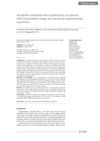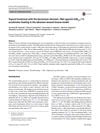 4 citations,
September 2020 in “Andrologia”
4 citations,
September 2020 in “Andrologia” Oregano extract helps fix testis and sperm damage caused by finasteride.
 3 citations,
November 2015 in “Journal of Investigative Dermatology”
3 citations,
November 2015 in “Journal of Investigative Dermatology” Testosterone can both promote hair growth and cause baldness by affecting hair growth signals.
 2 citations,
March 2021 in “Carpathian Journal of Food Science and Technology”
2 citations,
March 2021 in “Carpathian Journal of Food Science and Technology” Caraway, Chinese chives, and cassia may improve health and prevent diseases due to their nutrients and medicinal properties.
[object Object]  49 citations,
February 2020 in “Scientific reports”
49 citations,
February 2020 in “Scientific reports” The nanohybrid system significantly improved wound healing and showed strong antibacterial activity.
 36 citations,
March 2014 in “Biomaterials”
36 citations,
March 2014 in “Biomaterials” A new skin-whitening agent using a peptide from wheat is safe and effective at reducing skin pigmentation.
 26 citations,
March 2015 in “Phytotherapy Research”
26 citations,
March 2015 in “Phytotherapy Research” Forsythiaside-A, a natural substance, can protect against hair loss and is more effective than current treatments, potentially making it a good option for hair loss treatment.
 25 citations,
July 2016 in “The journal of investigative dermatology/Journal of investigative dermatology”
25 citations,
July 2016 in “The journal of investigative dermatology/Journal of investigative dermatology” Imiquimod cream activates hair follicle stem cells and causes early hair growth by changing immune cells and certain protein expressions.
 23 citations,
August 2018 in “Biochimica and biophysica acta. Molecular and cell biology of lipids”
23 citations,
August 2018 in “Biochimica and biophysica acta. Molecular and cell biology of lipids” Different sPLA2 enzymes affect immunity, skin and hair health, reproduction, and may be potential targets for therapy.
 23 citations,
June 2017 in “Drug Design Development and Therapy”
23 citations,
June 2017 in “Drug Design Development and Therapy” Cyclodextrins improve finasteride's solubility and bioavailability for hair loss treatment.
 18 citations,
January 2016 in “Elsevier eBooks”
18 citations,
January 2016 in “Elsevier eBooks” Nanotechnology improves cosmetics' effectiveness and safety.
[object Object]  16 citations,
October 2019 in “Biological & Pharmaceutical Bulletin”
16 citations,
October 2019 in “Biological & Pharmaceutical Bulletin” Houttuynia cordata extract may help hair grow by improving cell survival and increasing cell growth.
 16 citations,
January 2017 in “Archives of Medical Science”
16 citations,
January 2017 in “Archives of Medical Science” Sorafenib after liver surgery may increase survival for some liver cancer patients.
 7 citations,
December 2020 in “Pharmaceutics”
7 citations,
December 2020 in “Pharmaceutics” A mix of tocopherol acetate and L-menthol helps grow hair better than using them separately or using minoxidil.
 3 citations,
October 2022 in “PloS one”
3 citations,
October 2022 in “PloS one” Scientists have developed a method to keep chicken feather follicles alive and structurally intact in a lab for up to a week.
 3 citations,
October 2018 in “Archives of Dermatological Research”
3 citations,
October 2018 in “Archives of Dermatological Research” Applying InlB321/15 to wounds sped up healing in mice.
 1 citations,
October 2017 in “Dermatologic Clinics”
1 citations,
October 2017 in “Dermatologic Clinics” Men are increasingly using energy-based skin treatments for workplace success, with lasers and other devices effectively improving skin and body appearance.
 November 2024 in “Journal of Scientific Agriculture”
November 2024 in “Journal of Scientific Agriculture” Silk proteins are great for cosmetics because they protect and improve skin and hair while being eco-friendly.
 December 2023 in “Journal of the Endocrine Society”
December 2023 in “Journal of the Endocrine Society” Blocking glucocorticoid receptors improves glucose metabolism in a PCOS mouse model.
 June 2022 in “bioRxiv (Cold Spring Harbor Laboratory)”
June 2022 in “bioRxiv (Cold Spring Harbor Laboratory)” ILC1-like cells can cause alopecia areata by attacking hair follicles.

Chemotherapy can cause skin issues and hair loss, and this guide explains how to manage them.
 23 citations,
December 2021 in “Frontiers in Immunology”
23 citations,
December 2021 in “Frontiers in Immunology” IL-1 family cytokines are crucial for skin defense and healing, but their imbalance can cause skin diseases.
 April 2024 in “Expert opinion on investigational drugs”
April 2024 in “Expert opinion on investigational drugs” JAK inhibitors are safe and effective for treating moderate-to-severe alopecia areata.
29 citations,
March 2014 in “PloS one” Astragaloside IV may help prevent hair loss by blocking a specific pathway that leads to cell death.
 January 2024 in “Authorea (Authorea)”
January 2024 in “Authorea (Authorea)” Convalescent Plasma Therapy may help treat COVID-19 Long-Hauler symptoms.

The document suggests using convalescent plasma to treat COVID-19 Long Hauler Syndromes because it may contain beneficial elements that target the virus.
 9 citations,
April 2021 in “Frontiers in Immunology”
9 citations,
April 2021 in “Frontiers in Immunology” Unconventional lymphocytes are important for quick immune responses and healing of skin and mucosal barriers.
 8 citations,
January 2023 in “RSC Advances”
8 citations,
January 2023 in “RSC Advances” Carbon dots show promise for tissue repair and growth but need more research to solve current challenges.
 July 2024 in “Current Pharmaceutical Design”
July 2024 in “Current Pharmaceutical Design” Biodegradable polymers help wounds heal faster.
 May 2024 in “Journal of functional foods”
May 2024 in “Journal of functional foods” Coffee bean residue extract helps hair growth by activating cell processes.
 October 2022 in “Legume Research”
October 2022 in “Legume Research” The research found a way to grow plant tissue and analyze compounds in Bituminaria bituminosa, which is promising for hair restoration treatments.





























